
Sri Lanka's Permanent Representative to the UN in Geneva Ambassador Ravinatha Aryasinha, has said "the draft resolution on Sri Lanka deposited with the Human Rights Council by a core group comprising - the USA, UK, Mauritius, Montenegro and Macedonia, violates the constitutional provisions of Sri Lanka, is highly intrusive in nature and is in breach of the sovereignty of the Sri Lankan people and the territorial integrity of Sri Lanka". "In being politicised and in clear contravention of accepted principles of conduct in the Council", he said, "the resolution sets a bad precedent, and can in the medium-to-long term have an adverse impact on all developing countries in the Council".
Sri Lanka expresses reservations on attempts to politicise the situation of Sri Lanka in the Council
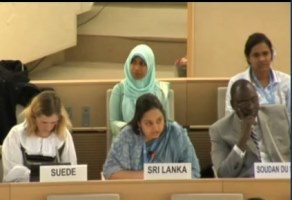
Sri Lanka has expresses its strong reservations on the misplaced reference in the Annual Report to the Secretary General’s Internal Review Panel (IRP) report on Sri Lanka including provision of link to the report in a footnote, in the context of prevention. We note however that the report relevant to the subject at hand is ‘the Rights Up Front’ plan of action, to which report, surprisingly, no such link is provided. The ‘Rights Up Front’ plan of action is not meant to be retroactive but forward looking. Regrettably, the misplaced attention paid to the IRP report, which is neither endorsed by the intergovernmental process nor based on credible sources and information, can only be construed as yet another attempt to politicise the situation of Sri Lanka in the Council.
Permanent Mission of Sri Lanka
Geneva
07.03.2014
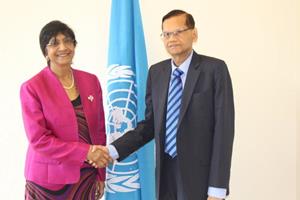
External Affairs Minister Prof. G. L. Peiris has said, the highly prejudiced actions taken by a few countries and the Office of the High Commissioner for Human Rights (OHCHR) to give disproportionate negative attention to Sri Lanka, has made the separatist Tamil elements in Sri Lanka and abroad more intransigent, making the intensely difficult task of reconciliation in Sri Lanka, even harder. He said it was unfortunate that Sri Lanka has become a “political football” in the electoral fortunes in some countries.
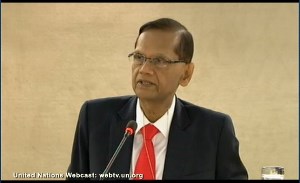
Minister of External Affairs and Leader of the Sri Lanka delegation Prof. G.L. Peiris, delivering the National Statement at the High Level Segment of the 25th Session of the UN Human Rights Council in Geneva today (5 March 2014), rejected the Report of the High Commissioner in its entirety, saying it was fundamentally flawed and disregarded the substantial progress made by the Government during the five years which have elapsed since the end of the thirty year conflict against terrorism. He said it also pays scant regard to the complexities and local nuances of a sensitive reconciliation process, while eroding confidence of the people of Sri Lanka by the constant changing of unjustifiable demands. Moreover, they persist in an attitude which is clearly disproportionate to the circumstances and inconsistent with the treatment of comparable situations. It is much to be regretted that the High Commissioner’s Report and those who exalt its virtues only seek to inflict harm on the reconciliation process by bringing about a polarisation of the Sri Lankan society.
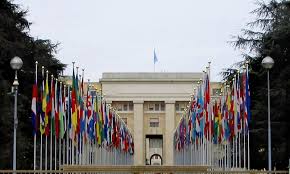
Minister of External Affairs, Prof. G.L. Peiris who leads the Sri Lanka delegation to the 25th Session of the Human Rights Council (HRC) arrives in Geneva on Tuesday (4 Match 2014), and is scheduled to deliver the Sri Lanka National Statement at the High Level Segment of the HRC on the morning of Wednesday.
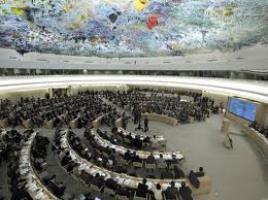
The Government of Sri Lanka (GOSL) has rejected the call by UN High Commissioner for Human Rights Navnanethem Pillay's "to establish an international inquiry mechanism to further investigate the alleged violations of IHRL and IHL and monitor any domestic accountability process in Sri Lanka", saying "it gives scant or no regard to the domestic processes ongoing in Sri Lanka within the framework of the LLRC NPOA, and is politicized in premise". The government said, the trajectory that has emerged with regard to the recommendation of the High Commissioner "reflects the preconceived, politicized and prejudicial agenda which she has relentlessly pursued with regard to Sri Lanka", since just a week following the defeat of terrorism in Sri Lanka, on 26th May 2009 at the 11th Special Session of the UNHRC on Sri Lanka, and at subsequent sessions and reports. It is noted that the reference in the current report that “the High Commissioner remains convinced” for an “independent, international inquiry” demonstrates her persistent efforts against Sri Lanka. Sri Lanka said, "it is pertinent to question the factual basis for the High Commissioner’s initial formal call to the HRC for an independent, international investigation in May 2009 and its continuation, in order that the international community not be misled".
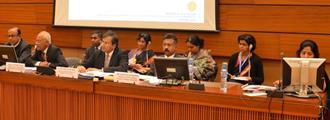
Secretary to the President Lalith Weeratunga who briefed Permanent Representatives to the United Nations in Geneva at the Palais des Nations on Tuesday (21st January 2014) on ‘Progress in the reconciliation process in Sri Lanka’, has said the Government of Sri Lanka has done all that was humanly possible to implement the recommendations of the National Plan of Action on the implementation of the LLRC, since its approval by the Cabinet of Ministers in July 2012.
